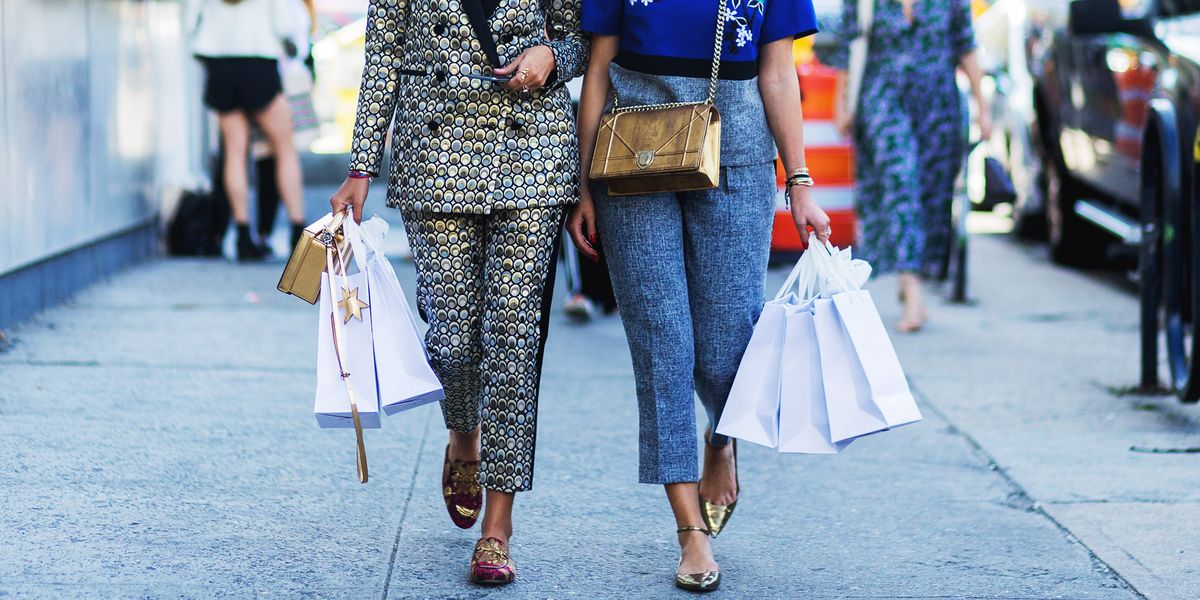

Getty ImagesChristian Vierig
Sometimes it occurs to me— in the middle of a 2 A.M. search for a vintage Dior maillot, or a passive afternoon hunt for the boots that might get me through another New York winter—that I shouldn’t be doing this alone. Don’t I need the friend in the next stall, the body and life to which I’ll compare mine? Shopping online was common by the time I turned 20 and ubiquitous a few years later, but there was a time I could map the emotional milestones in my life by what I bought, and where, and who saw me half-naked as I tried on a thousand versions of myself.
Advertisement – Continue Reading Below
Clothing was the first way I defined myself in my small Northern California town, hoping to signal to the rest of my life that I was ready to walk into it. I spent high school afternoons smoking cigarettes with my friend Phoebe, who was beautiful and six feet tall, loud as a bullhorn, and somehow equipped with both perfect breasts and a private garden apartment behind her parents’ Victorian home. One day she braided my hair and we ditched last period, and in a fluorescent-lit thrift store I tried on the piece that came to define how I would dress for the next decade—a high-waisted ’60s pencil skirt, linen, modernist red. I almost didn’t buy it. It was Phoebe who convinced me, bursting through the curtains and gasping, pointing out the feminine curves it had conjured from nowhere. I’ll kill you if you don’t buy it, she said. I wore it the next morning with a cream-colored secretary blouse and ballet flats I had stapled ribbons into to twine up my ankles. As I crossed the frosted grass of the quad, coatless and freezing so as not to obscure my purchase, feeling half like a fool and half like someone of exquisite power and beauty, I heard Phoebe yelling, Who is that? Who is she?
When I think of dressing rooms, it’s not always the bawdy encouragement that comes to mind, but rather the bleak or frank things that the strange, forced intimacy of the space made it possible to say. The summer my father died, the year I turned 15, my half sister took me to the mall to get a dress for his memorial. I remember sliding down the wall of the fitting room in that godforsaken Macy’s, finally sobbing. She heard my squeaks and joined me on the grimy carpet, where I told her I did not want to buy a dress, did not want to buy anything; that there was nothing to be bought that would make me the girl I wanted to be, someone who knew nothing about addiction or hospitals or slow, visible dying. She crouched there for a long time, until I was able to stand, and then, zipping me into that boxy polyester, she began to help me imagine the person who could find the dignity in black, someone who could see that dignity in others.
Advertisement – Continue Reading Below
Had my adulthood in the sartorial cyclone of New York City unfolded 20 years ago, it might have been a montage of secrets about kinky sex or careerist jealousies confessed in understated lingerie from behind a curtain. Now, at 29 and single, I do most of my shopping alone or online. Though I sometimes miss the image of a hand floating over the flimsy divider, I’m not convinced that as women we have forgotten how to use the things we buy and wear as a bridge to each other. Sometime last fall, feeling hopeless about the relationship that I had failed to get over and the dim basement apartment I’d moved into when it ended, I texted my girlfriend Connie, who works in fashion and lives on my street, a screenshot of some embroidered boots I was considering buying. They were too much money, white with a baroque black overlay, and I could not decide if they were stunning or looked like an accent carpet. Uh-oh, I wrote. It’s after 11 o’clock and I’m about to pull the trigger on these. One of those very powerful women whose strength lies in diplomacy, Connie always turns a thought over before she says it, and she is someone I can always trust to be gentle with my impulses. Her ellipsis appeared immediately, then withdrew. I don’t know what’s going on with me, I typed. Do these say ‘single mom driving you to the concert with the windows down’?!
Will you be up a while? she wrote. I’m on the train but could be there in 10.
Kathleen Alcott is the author of Infinite Home and The Dangers of Proximal Alphabets.
This article originally appears in the April 2018 issue of ELLE.
Be the first to comment